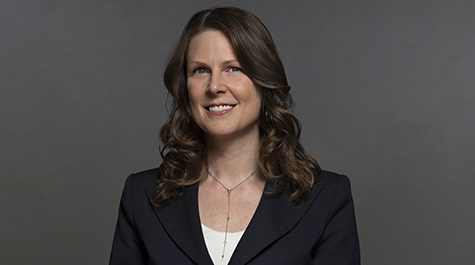Off to the Races: Liz Howard ’09 Reflects on the Election Law Society and Other Voting Matters
How do law students create an Election Law Society that gets students involved in election law issues? If you’re Liz Howard ’09 and friends, you simply ask.
In 2006, Howard and first-year classmate Brandi Zehr took their request to Professor Dave Douglas, then director and co-founder of William & Mary Law School’s new Election Law Program.
“We wanted to do something, and we had this amazing Election Law Program,” Howard says. “So we went to Professor Douglas with some wild ideas; he was very helpful, and we were off to the races.”
The resulting Election Law Society (ELS) grew into a multi-partisan student organization dedicated to studying the legal issues raised through the American electoral process. Students in ELS help other law students better understand election law issues through an open and honest dialogue about the issues’ origins and impacts.
Through her involvement with ELS, Howard took classes on campus and in Washington, D.C., where she interacted with election law experts and practitioners. “The opportunity to learn from practitioners in D.C. was truly phenomenal,” she says. “In essence, it was real-time learning using real-life scenarios.”
Howard’s trajectory from ELS into a busy career in election law reflects her longtime interest in politics. Originally from Tennessee, she admits to not voting in the 2000 presidential election, but the drawn-out process and acrimony during the Bush v. Gore chad counting made her aware of the many problems in the system.
“Just running my mouth as an outsider was not particularly helpful,” Howard says, “so I think the election really piqued my interest in getting involved in the process.”
At the time working as an accountant, Howard started volunteering for Phil Bredesen, a former mayor of Nashville running for governor in Tennessee. She first joined his campaign and then his administration. She loved the job and eventually ended up in Virginia where she worked on John Kerry’s presidential bid.
It was then that she happened upon William & Mary.
“I just fell in love with the campus and with the Law School,” Howard says. “Then, when I found out that Professor Douglas had an election law program, I thought ‘this is amazing.’”
At the Law School, she discovered classmates from a wide variety of political backgrounds, all sharing “a real fire and real interest in elections and political law.” The addition of election law expert Rebecca Green to the faculty during Howard’s 2L year was icing on the cake.
“Professor Green was just magic,” Howard says. “She and Professor Douglas enabled all of us to flourish in the political law sphere, helped us get jobs, and do all sorts of work. Many of us got to basically try out for the law firms we ended up working for because the Law School worked with us to recruit partners in law firms that have political law practice to serve as adjuncts.”
Howard has held numerous prestigious political law positions since graduation. She was an associate at Sandler Reiff, specializing in election law, and later served as General Counsel of Rock the Vote. As Deputy Commissioner for the Virginia Department of Elections, she coordinated a number of election administration modernization projects, including the decertification of all paperless voting systems, implementation of the e-Motor Voter program, and adoption of online, paperless absentee ballot applications. The latter innovation ensured that the department received a 2017 Innovations in American Government Bright Ideas Award from the Ash Center for Democratic Governance and Innovation at the Harvard Kennedy School.
Making a difference didn’t go unnoticed at her Law School. In March 2014, Howard was honored with the ELS Alumnus of the Year Award during the Second Annual D.C. Friends of ELS Reception at the offices of Wiley Rein.
Currently, Howard serves as senior counsel for the Brennan Center’s Democracy Program, where she works with state and local election officials, academics, technology experts and cybersecurity legends on piloting various election security measures. She regularly comments for television, radio and print media on issues relating to election security and election administration, and has testified before the U.S. House Committee on Homeland Security and in a variety of state legislatures. She has also co-authored multiple Brennan Center reports and white papers.
Unlike the often contentious partisan rancor on display at the national level, Howard says that on more local levels she finds important allies on administration reform and election administration best practices on both sides of the aisle.
“Election officials have to work with actual voters, which does tend to minimize the partisanship at the local level,” she says. “We may not be to work together on everything, but there’s so much that we can solve together, and it’s great to have the opportunity to do so.”
Despite her busy schedule, which gets busier and more hectic as the November 3 election approaches, Howard takes great satisfaction from her important work.
“What still gets me most fired up is talking to voters, helping them navigate an issue and ensuring that they can cast a ballot,” she says. “It’s an honor to have a role in strengthening our democracy and to continue my work with voters and election officials.”
About William & Mary Law School
Thomas Jefferson founded William & Mary Law School in 1779 to train leaders for the new nation. Now in its third century, America's oldest law school continues its historic mission of educating citizen lawyers who are prepared both to lead and to serve.



